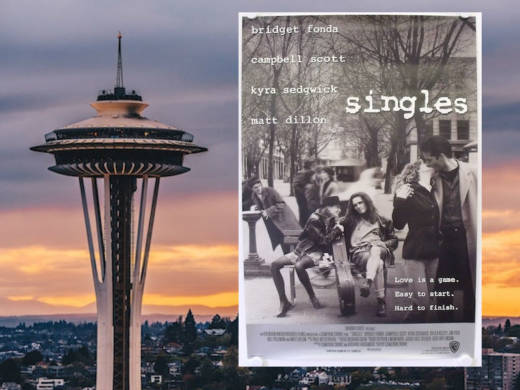When the music of 1992 still holds up so well in 2017, it's easy to forget how much other stuff from that year does not. To re-watch Singles now is to bear witness to the last gasps of human existence before the internet. There are scenes in this movie that revolve around phone booths in clubs, fax machines, malfunctioning cassette tapes, super-huge garage door openers, video dating, digital watches that are impressive because they “can store 20 numbers,” and those little boxy, beige computers with black screens and green letters. Singles is set in a time when people still met at elaborate magazine racks on street corners, and lost touch because of missed phone calls made to unreliable landlines.
One of the main reasons Singles doesn't hold up is because, in 2017, it kind of doesn't make sense. Despite a marketing campaign that focused on the grungier side of the movie, the main couple featured, Steve and Linda, are decidedly straight-laced. So, watching it now, you can't help but wonder what the hell they're doing hanging around at Alice in Chains concerts. In the grunge-crazy world of 1992, when frat boys enthusiastically attended Nirvana shows, it didn't seem that weird; today, it looks completely implausible.
The biggest problem of all though has nothing to do with the passage of time. Re-watching Singles now, it's difficult not to question if this movie would even have been made if not for the Seattle backdrop, band cameos, and impressive soundtrack. The best scenes are the ones that nod to the music-lovers in the audience. The fact that Matt Dillon's character, a vocalist named Cliff, sings a song titled "Touch Me, I'm Dick" -- a knowing cover of Mudhoney classic "Touch Me, I'm Sick" -- is still pretty fun. As is watching Chris Cornell wander up next to a car and head-bang along to its freshly-fitted stereo. Seeing three members of Pearl Jam pretend to be dopey rockers is still pretty entertaining too. It's these small moments that provide all of the fun in Singles. Take them away, and you're not left with a whole lot of substance.
The truth is, with hindsight, Singles looks like a not-great preamble to Crowe's other music movie, the almost perfect Almost Famous. The 2000 film that made Kate Hudson a star was set in the world of 1970s rock 'n' roll tours and was significantly more successful at capturing the tone of that very specific time and place. Almost Famous was fantastic because it went all in and committed. By contrast, Singles uses grunge as a canvas and a marketing tool, but is unwilling -- or was unable at the time -- to focus on that scene wholeheartedly. In the end, this is a grunge movie that seems fearful of alienating non-grunge audiences, which means neither grunge fans nor mainstream folk can leave satisfied.
It's that fear of commitment that also makes for a cast of unlikeable characters. The main grunge guy in the whole thing is a narcissistic imbecile (Cliff), his grunge girlfriend is needy and too wholesome (Janet), and the regular folk (Steve, Linda and, to a lesser degree, Debbie) are all frequently-insufferable bores.
In 2017, the world can still look back on grunge with a swell of warm nostalgia. It was the last great music scene to truly dominate American culture, precisely because it was happening at a time when the world was still reliant on major labels, tight local scenes, MTV, and record stores to sell us the coolest stuff to listen to. That kind of mass consumption and focus all went out of the window with Napster, and, to a far greater degree, the digitization of music.
The Singles soundtrack -- featuring outstanding work by Pearl Jam, Mudhoney, Alice In Chains, Soundgarden, Screaming Trees, Mother Love Bone, The Replacements, and Smashing Pumpkins -- might be one of the most solid in movie history. It's worth checking out for Smashing Pumpkins' contribution alone ("Drown" remains one of the band's best ever tracks). But while the Singles soundtrack is still something we can most certainly turn to when we crave that very specific time in music history, you're probably better off skipping the movie.


